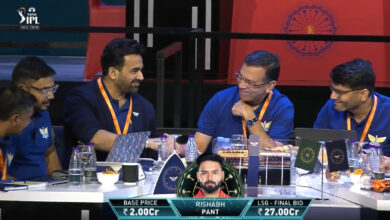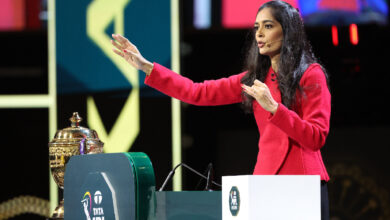WTC Final: Umesh Yadav and Mohammed Shami bottle up Australia and enable India to hope for a dreamy finish

The laidback crowd were finding their way to their seats, French fries and refreshment in their hands, when Umesh Yadav let out a roar of joy and injected a spontaneous frenzy in the stands. The ground for Yadav’s celebrations was worth revisiting. He had conjured a peach—the world of Yadav swings from the grand to bland—to rip out Marnus Labuschagne, a white wall of resance until that moment.
The ball landed on a full length, angled in from wide of the crease, sucking him into the forward defensive, albeit with a shy front-front stride, and deviated just after pitching. and deviating inch-perfectly to kiss the outside edge of his bat. Yadav has produced similar golden balls several times in his career, but too less frequently to have made an uninterrupted career out of it. He released all his pent-up rage after the torrent of criticism slapped at him for two reasons. A) He was picked ahead of Ravi Ashwin; B) his first spell on the first day would have enraged even a grade-cricket captain. He plugged on earnestly for the remainder of the game, and ended the first innings with the best economy rate among the quartet of seamers. He needed redemption—a reference point that could dwell on how good he could be when the rhythm and mood align.
Suddenly, India found belief and strength from nowhere. The match seemed a lost cause—Australia’s lead was nudging 300, already a steep one—but there was still a fight to be fought, a battle to be waged. If you can’t stop Australia from running away with the game, they could at least decelerate their march, make the road to glory arduous. The body language changed. Energy replaced lethargy, hope displaced agony. The slip cordon reclaimed the gust of their throat-boxes, fielders rediscovered the spring in their step.
In the next eight overs, India conceded just 18 runs. Another wicket eluded, though both Yadav and Mohammed Shami repeatedly had batsmen clasping at the thin air. Yadav steamed in like a locomotive making up for lost time, Shami discovered the vicious tenor that makes him such a deadly red-ball proposition. For most of this Test, he had seemed fatigued from the two-month labour of the IPL, where he was the highest wicket-taker. Here, he was making the ball hoop and hem this way and that, making Australia’s batsmen shed all their aggressive intention.
With a cushion of 296 runs overnight, Australia’s plan might have been to ring in the fourth morning with a flurry of boundaries and set India an imposing target at the earliest, furnishing as much as time as they could for the bowlers to bowl out India, even if there was a valiant rearguard. Test match cricket is such a beast that you need to weigh in all the scenarios and eventualities. The effervescence of Shami and Yadav shoved them back to embracing circumspection. Carey would still find the occasional boundary, but there was no barrage of boundaries.
Cameron Green recited nonviolent tunes, as opposed to the heavy metal riffs he was belting out in the IPL. Shami hustled him nip-backers and Yadav probed him with out-swingers. Green managed to hit just two fours in that spell, one an edge that bounced and nutmegged Shubman Gill at slip and the next when Shami over-pitched, whereupon he drove sumptuously down the ground.
The tired bowling pair gave away to Mohammed Siraj and Ravindra Jadeja, who sustained the intensity. Carey and Green mustered largely streaky 25 runs in the next 11 overs. Siraj whipped hostility, as he had in his spell to Labuschagne on Thursday. He rammed Green on the gloves with a vicious lifter that soared past KS Bharat for a four, after he had hammered a short-ball onto his shoulder. Green was visibly shaken, and the nervousness eventually led to his uncharacteric exit—bowled when trying to kick a Jadeja ball away—for a 95-ball 25.
When Green departed, Australia’s score was 167/6, the morning session thus far yielding only 45 runs in 19 overs. Carey was left with no other option but to pursue risks, which he succeeded in pulling off. He was not always in control in the first half of the innings, an unintended late cut screamed between third slip and gully. Two fours in an over then reversed the tide, and India’s intensity swiftly withered as lunch ushered in. The mood for fight gave way to slack resignation. The last seven overs bled 34 runs. The shoulders drooped, the eyes sunk, and the voice faded away. All they managed to do was to delay the declaration, and perhaps not let Australia screech away to a total of 500. But the session formed an integral passage of what turned out to be a captivating day of Test cricket. And how it all started with that peach and roar of Yadav.







